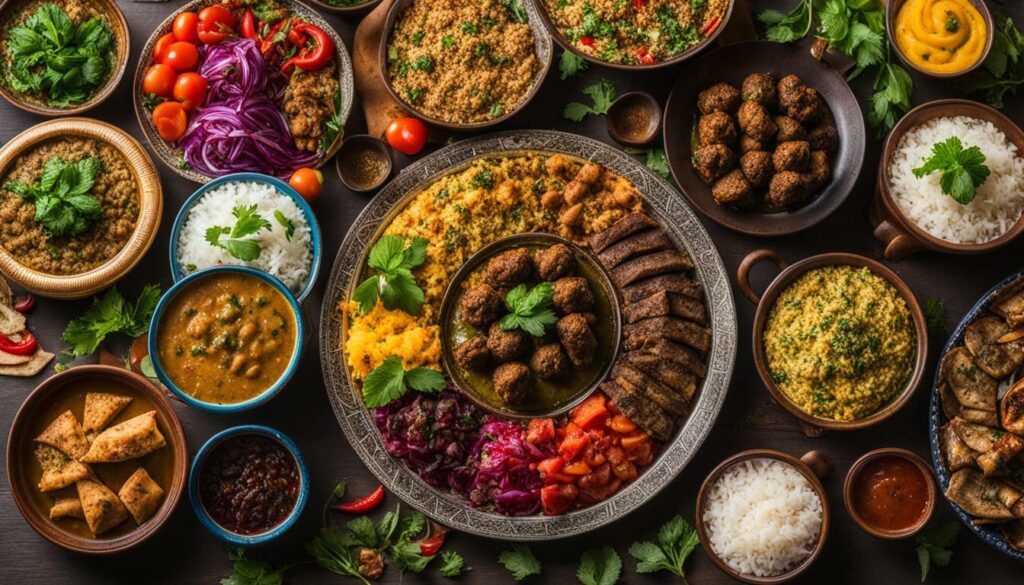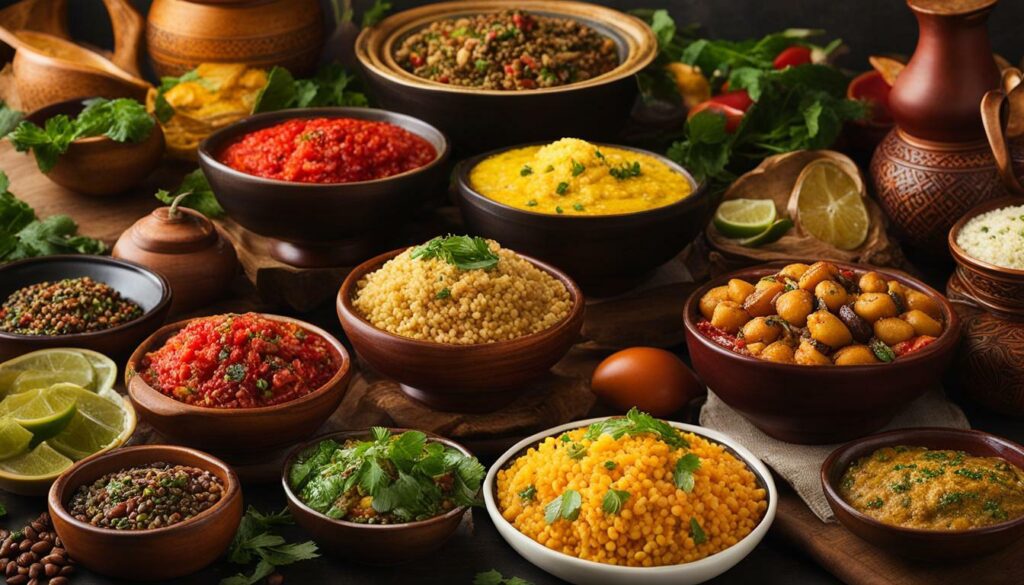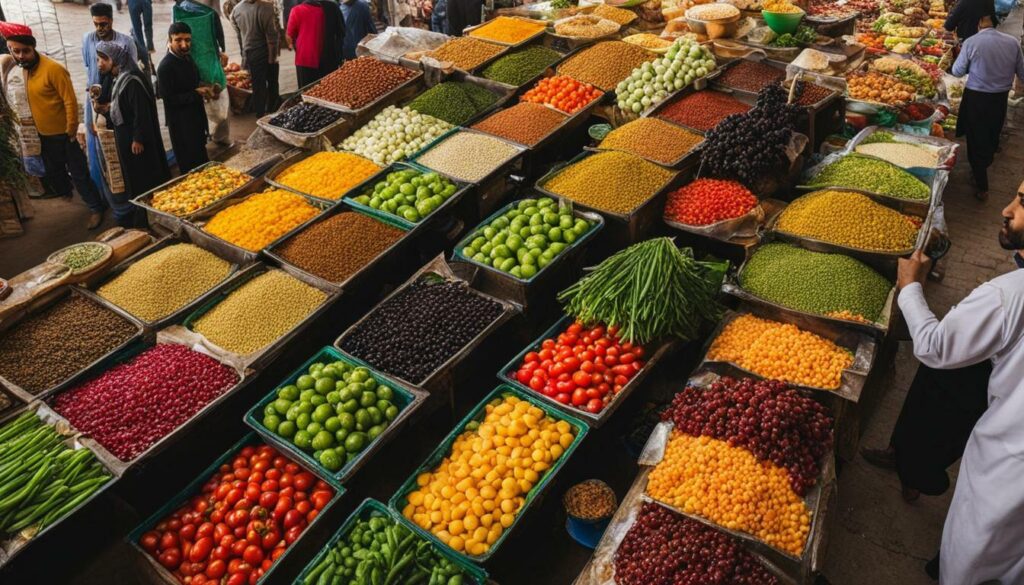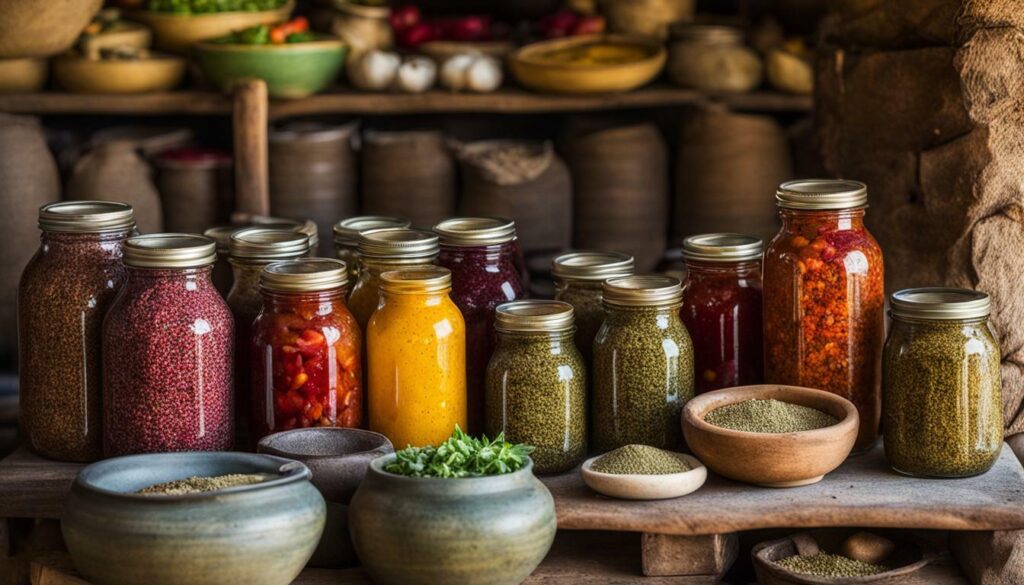The past and present diets of Iraq offer a captivating glimpse into the country’s rich culinary heritage and the changes in eating habits over time. Iraqi cuisine is known for its diverse flavours, influenced by neighbouring countries such as Greece, Persia, and Syria. Traditional Iraqi foods, which include staple ingredients like rice and regional specialities like dolma and kebab, continue to be enjoyed alongside modern dishes. The inclusion of expensive meats and the use of every part of the animal reflect the importance of nutrition and resourcefulness in Iraqi cooking. Additionally, traditional fermented foods and beverages have been an integral part of the Iraqi diet for thousands of years, offering both cultural significance and health benefits.
Key Takeaways:
- Iraqi cuisine is known for its rich and refined flavours.
- Expensive meats like sheep, lamb, chicken, beef, goat, and fish are commonly eaten.
- Every part of the animal is considered nutritious and cooked, including the organs.
- Pork is not consumed due to religious reasons.
- Traditional Iraqi foods include kebab, dolma, biryani, and masgoulf.
Traditional Foods of Iraq
Traditional Iraqi foods encompass a wide array of rich and refined flavours, with expensive meats and unique dishes that reflect the country’s cultural heritage. Iraqi cuisine is known for its use of high-quality meats such as sheep, lamb, chicken, beef, goat, and fish. These meats are often prepared in traditional ways, such as grilling or barbecuing, to bring out their natural flavours. In addition to the popular meats, every part of the animal is considered nutritious and utilized in cooking, including the organs.
Pork is not consumed in Iraq due to religious reasons, but there is an abundance of other delicious dishes to enjoy. Some common traditional Iraqi foods include kebab, which is skewered and grilled meat dishes, dolma made from stuffed grape leaves, aromatic biryani rice, and masgoulf, a barbecued and grilled carp dish that is popular in southern Iraq.

The culinary influences on Iraqi cuisine have come from neighbouring countries like Greece, Persia, and Syria. These influences have contributed to the diverse flavours and unique ingredients used in Iraqi dishes. For example, Greek influence can be seen in dishes like baklava, a sweet pastry dessert, while Persian influence is evident in dishes like kubba, a type of stuffed meatball. Syrian influence can be seen in dishes like falafel, a deep-fried chickpea fritter.
Staple foods in Iraq include rice and regional specialities like dolma and kebab. Rice is often used as a base for many dishes and is cooked with various spices and ingredients to create flavorful rice dishes. Dolma, which consists of stuffed grape leaves or vegetables, is a popular side dish often served with meals. Kebab, made from skewered and grilled meats, is a staple in Iraqi cuisine and is enjoyed by locals and tourists alike.
Traditional Iraqi Foods
- Kebab
- Dolma
- Biryani
- Masgoulf
Traditional fermented foods and beverages are also an important part of Iraqi cuisine, with recipes dating back thousands of years. These fermented foods and beverages include dishes like Basturma, a dried and cured meat, Aushari cheese, which is aged and tangy, Turshi, a variety of pickled vegetables, and Sour Khobz, a sourdough bread. Popular fermented beverages include Shanina, a yogurt-based drink, Sharbet Zbeeb, a syrup made from dried fruits, and Erk Sous, a fermented barley beverage.
These traditional fermented foods and beverages not only add unique flavours to Iraqi cuisine but also provide numerous health benefits. The fermentation process enhances the bioavailability of nutrients and introduces beneficial probiotics to the gut. This contributes to improved digestion and overall gut health, which is essential for a healthy immune system and general well-being.
The potential for commercializing traditional fermented foods in Iraq is significant. The preservation of these culinary traditions not only supports the economy but also helps keep the cultural heritage alive. Large-scale production of Iraqi fermented foods can create job opportunities and contribute to the promotion of Iraqi cuisine on a global scale, allowing people from different parts of the world to experience the unique flavours and traditions of Iraqi food.
| Dish | Description |
|---|---|
| Basturma | A dried and cured meat dish |
| Aushari cheese | Aged and tangy cheese |
| Turshi | Assorted pickled vegetables |
| Sour Khobz | Sourdough bread |
Culinary Influences on Iraqi Cuisine
The culinary influences on Iraqi cuisine can be traced back to its geographical location and historical interactions with neighbouring countries such as Greece, Persia, and Syria. These influences have shaped the flavours and ingredients used in Iraqi dishes, creating a unique and diverse culinary heritage.
One notable influence on Iraqi cuisine is the Greek influence, which can be seen in dishes like dolma, a popular Iraqi dish of stuffed grape leaves. The Greeks introduced the concept of stuffing vegetables with various fillings, and this technique was adopted and adapted by the Iraqi people. Dolma is typically filled with a mixture of rice, meat, and spices, and is often served as an appetizer or part of a larger meal.
Another significant influence on Iraqi cuisine is the Persian influence. The Persians introduced a variety of ingredients and cooking techniques to Iraq, including the use of fragrant spices and the art of grilling meat. Kebab, a dish of grilled meat, is a prime example of the Persian influence on Iraqi cuisine. It is made using marinated chunks of meat (typically lamb or beef) and is often served with rice or flatbread.
Additionally, the neighbouring country of Syria has also played a role in shaping Iraqi cuisine. Syrian culinary traditions have influenced Iraqi dishes like masgoulf, a traditional Iraqi dish of barbecued and grilled carp. The technique of marinating and grilling fish is believed to have been introduced to Iraq by Syrian traders and has become a popular dish in the country.
Overall, the culinary influences on Iraqi cuisine have added depth and diversity to its flavours and ingredients. The Greek, Persian, and Syrian influences, among others, have contributed to the rich and refined flavours that characterize Iraqi dishes, making it a cuisine that is both historically and culturally significant.

| Culinary Influence | Example Dish |
|---|---|
| Greek | Dolma (stuffed grape leaves) |
| Persian | Kebab (grilled meat) |
| Syrian | Masgoulf (barbecued and grilled carp) |
Staple Foods in Iraq
Rice is a staple ingredient in Iraqi cuisine, often accompanied by regional specialities such as dolma and kebab, which add depth and flavour to traditional meals. The Iraqis have perfected the art of cooking rice, resulting in dishes that are fragrant and fluffy. The rice is typically seasoned with spices like cinnamon, cardamom, and nutmeg, giving it a distinct aroma that is characteristic of Iraqi cuisine.
Dolma, another popular staple in Iraq, consists of grape leaves filled with a mixture of rice, meat, and herbs. This dish is then simmered in a savoury sauce, creating a tasty and satisfying meal. Kebabs, on the other hand, are grilled skewers of marinated meat, often served with rice and a variety of side dishes.
To give you a better understanding of the staple foods in Iraq, here is a table showcasing some of the common ingredients and dishes:
| Ingredient | Dish |
|---|---|
| Rice | Biryani |
| Meat (sheep, lamb, beef, chicken, goat) | Kebab |
| Grape leaves | Dolma |
| Spices (cinnamon, cardamom, nutmeg) | Rice pilaf |
These staple foods reflect the rich culinary heritage of Iraq and are enjoyed by both locals and visitors alike. They are a testament to the vibrant flavours and diverse influences that have shaped Iraqi cuisine over the centuries.

Exploring the staple foods of Iraq gives us a glimpse into the country’s traditional cuisine and cultural identity. The combination of rice, dolma, and kebab forms the foundation of many Iraqi meals, providing nourishment and satisfaction to those who partake in them.
Traditional Fermented Foods and Beverages in Iraq
Traditional fermented foods and beverages hold a special place in Iraqi cuisine, with recipes dating back thousands of years and offering unique flavours and health benefits. These fermented delights are an integral part of the culinary heritage of Iraq, preserving age-old traditions and bringing forth a delightful range of tastes and textures.
Among the traditional fermented dishes, Basturma stands out as a beloved favourite. Made from air-dried beef that is seasoned with a blend of spices, this rich and flavorful cured meat is a staple in Iraqi households. The process of fermentation enhances its taste and texture, resulting in a savoury and tender delight that pairs well with bread or rice.

Another must-try fermented food in Iraq is Aushari cheese, which is made by fermenting sheep or goat milk. This unique cheese has a tangy and slightly salty flavour profile, making it a versatile ingredient that can be used in a variety of dishes. Its creamy texture and distinct taste add depth and complexity to traditional Iraqi recipes.
In addition to fermented foods, Iraq boasts a wide array of traditional fermented beverages. Shanina, for example, is a popular fermented barley drink that is enjoyed by Iraqis for its refreshing taste and nutritional benefits. Its natural fermentation process gives it a distinct tanginess and effervescence, making it a beloved thirst quencher on warm Iraqi days.
| Fermented Foods | Fermented Beverages |
|---|---|
| Basturma | Shanina |
| Aushari cheese | Sharbet Zbeeb |
| Turshi | Erk Sous |
| Sour Khobz |
These traditional fermented foods and beverages of Iraq not only tantalize the taste buds but also offer numerous health benefits. Fermentation increases the bioavailability of nutrients and introduces beneficial bacteria, known as probiotics, which promote gut health and enhance digestion. The unique flavours and textures of these fermented delights make them a cherished part of Iraqi cuisine, celebrated for their cultural significance and contribution to overall well-being.
Health Benefits of Traditional Fermented Foods
Traditional fermented foods in Iraq not only delight the taste buds but also offer a range of health benefits, thanks to the presence of probiotics and bioactive compounds. Fermentation is a natural process that involves the breakdown of complex substances into simpler forms with the help of bacteria, yeasts, or other microorganisms. This transformative process enhances the nutritional value and digestibility of foods, making them easier on the stomach and promoting better nutrient absorption.
One of the key health benefits of fermented foods is the presence of probiotics. These beneficial bacteria help maintain a healthy balance of microflora in the gut, supporting digestion and boosting the immune system. They can also improve the absorption of nutrients, such as vitamins and minerals, and reduce the risk of certain gastrointestinal disorders. Additionally, probiotics have been linked to improved mental health and a stronger overall immune response.
Furthermore, traditional Iraqi fermented foods are rich in bioactive compounds, such as antioxidants, which have been shown to have numerous health benefits. Antioxidants help protect the body against oxidative stress and reduce inflammation, which is associated with chronic diseases like heart disease, diabetes, and certain types of cancer. By incorporating fermented foods into their diets, individuals can increase their intake of these beneficial compounds, supporting overall health and well-being.
| Fermented Foods in Iraq | Health Benefits |
|---|---|
| Basturma | High in protein and essential amino acids |
| Aushari cheese | Rich in calcium, phosphorus, and healthy fats |
| Turshi | Packed with vitamins, minerals, and beneficial bacteria |
| Sour Khobz | Provides a good source of fiber and aids digestion |
Incorporating traditional fermented foods into your diet can be a simple and delicious way to improve your overall health. Try adding dishes like Basturma, Aushari cheese, Turshi, and Sour Khobz to your meals to experience the benefits of these probiotic-rich foods. However, it is important to note that fermented foods should be consumed in moderation, as excessive consumption may not be suitable for everyone, especially those with certain medical conditions or compromised immune systems.

In conclusion, traditional fermented foods in Iraq offer not only delightful flavours but also significant health benefits. The presence of probiotics and bioactive compounds in these foods promotes a healthy gut microbiome, enhances nutrient absorption, and reduces inflammation. By incorporating dishes like Basturma, Aushari cheese, Turshi, and Sour Khobz into their diets, individuals can enjoy the unique flavours of Iraqi cuisine while reaping the rewards of improved digestive health and overall well-being.
Changes in Eating Habits in Iraq
Like many other nations, Iraq has experienced changes in its eating habits, influenced by globalization and the rise of new food trends. These changes have brought both opportunities and challenges to traditional Iraqi cuisine, shaping the way people eat and perceive food in the country.
One noticeable change in eating habits is the increasing consumption of fast food and packaged convenience foods. With the advent of fast-food chains and the availability of pre-packaged meals, the convenience and speed of these options have appealed to busy individuals in urban areas. However, the high content of processed ingredients and unhealthy additives in these foods has raised concerns about the impact on public health.
Another significant change is the growing interest in international cuisines and fusion food. Iraqi people, especially the younger generation, are increasingly exposed to different cuisines through travel, media, and globalization. This exposure has led to a curiosity and desire to explore new flavours and culinary traditions. As a result, restaurants offering international dishes and fusion cuisine have emerged, catering to the evolving tastes and preferences of the Iraqi population.
While these changes have brought diversity and excitement to the food scene in Iraq, there is also a concern about the potential loss of traditional culinary practices. As people embrace new food trends, there is a risk of neglecting or forgetting the rich heritage of Iraqi cuisine. Efforts are being made by cultural organizations and food enthusiasts to preserve and promote traditional Iraqi dishes, emphasizing their nutritional value, cultural significance, and unique flavours.
Despite the changes in eating habits, certain cultural practices and customs remain deeply ingrained in Iraqi society. Family meals, for example, continue to be valued and are often regarded as a time for bonding and socializing. Traditional dishes such as kebab, dolma, and biryani still hold a special place in Iraqi cuisine and are regularly enjoyed during festive occasions and gatherings.

Current Food Trends in Iraq
When it comes to current food trends in Iraq, there has been a growing interest in organic and locally sourced ingredients. This reflects a broader global movement towards sustainable and healthy eating. People are increasingly conscious of the environmental impact of food production and the benefits of consuming fresh, natural produce.
Furthermore, there is a rising demand for vegetarian and vegan options in Iraq. This shift is driven by various factors, including health consciousness, ethical considerations, and the desire to explore plant-based alternatives. Restaurants and food establishments are responding to this demand by offering a wider range of vegetarian and vegan dishes, showcasing the versatility and creativity of plant-based cooking.
In conclusion, the eating habits in Iraq have undergone significant changes due to globalization and the emergence of new food trends. While these changes have brought diversity and excitement to the culinary landscape, efforts are being made to preserve and promote traditional Iraqi cuisine. As Iraq continues to navigate the dynamic world of food, it is essential to strike a balance between embracing innovation and safeguarding the cultural heritage embedded in its rich and flavorful traditions.
Tea, Coffee, and Water as Common Drinks
Tea takes centre stage as the most common drink in Iraq, accompanied by coffee and water, which are also enjoyed by individuals across the country. Tea is a staple beverage in Iraqi cuisine and is often served throughout the day, accompanying meals or enjoyed as a social drink. It is typically brewed strong, with a deep amber colour and a slightly bitter taste. Iraqi tea is often flavoured with cardamom, adding a hint of spice to its aromatic profile. The tea is enjoyed hot, and sugar is commonly added to sweeten the brew to personal preference.
Coffee, particularly Arabic coffee, is also popular in Iraq. It is typically brewed strong and served in small cups, often accompanied by dates. Traditional preparation involves roasting the beans and grinding them before brewing. The resulting dark, rich coffee is known for its robust flavour and earthy undertones. Drinking coffee in Iraq is not just about enjoying the beverage itself; it is a cherished cultural ritual that brings people together for conversation and relaxation. Coffee is often served during social gatherings and special occasions.
Water, of course, is a fundamental element in Iraqi cuisine and is widely consumed to quench thirst and stay hydrated. As the climate in Iraq can be hot and dry, staying adequately hydrated is key. Water is often served with meals, and it is common for Iraqis to drink water throughout the day to maintain good health and well-being.
| Common Drinks in Iraq | Description |
|---|---|
| Tea | The most popular drink in Iraq, often flavoured with cardamom and served hot. |
| Coffee | Particularly Arabic coffee, brewed strong and typically served in small cups. |
| Water | Fundamental and widely consumed for hydration and general well-being. |

Tea is a drink of serenity, a savoring of the moment, and a way to share warmth and hospitality. Coffee brings people together, stimulating conversations and fostering a sense of community. And water, the elixir of life, keeps us refreshed and invigorated. In Iraq, these common drinks not only nourish the body but also reflect the culture’s rich traditions and values.
Dining Etiquette in Iraq
Dining in Iraq is not just about the food but also about adhering to specific etiquette rules, which vary depending on the setting and cultural norms. Iraqi society places great emphasis on hospitality and respect for guests, and these principles are reflected in the dining etiquette followed by Iraqis. Whether dining in a restaurant or at someone’s home, it is important to observe certain customs and traditions to show appreciation for the food and the host.
When attending a meal in Iraq, it is customary to dress conservatively, particularly in more traditional or formal settings. Modest clothing is expected, with women often wearing long sleeves and avoiding revealing attire. It is also important to remove your shoes before entering someone’s home or a more traditional restaurant, as a sign of respect.
Another important aspect of dining etiquette in Iraq is the observance of gender separation in conservative settings. In some cases, men and women may be seated separately during meals, with women typically dining in a private area of the house or in a separate room. This separation is rooted in cultural traditions and religious practices, and it is important to respect and adhere to these customs.
| Etiquette Rules in Iraqi Dining |
|---|
| 1. Dress conservatively, especially in traditional or formal settings. |
| 2. Remove your shoes before entering someone’s home or a traditional restaurant. |
| 3. Observe gender separation in conservative settings. |
| 4. Wait for the host or elder to start eating before you begin. |
| 5. Eat with your right hand, as the left hand is considered unclean. |
| 6. Accept food and drink offerings with your right hand, using your left hand to support your right wrist. |
| 7. Avoid discussing sensitive topics such as politics or religion during meals. |
Furthermore, it is customary to wait for the host or the eldest person at the table to start eating before you begin. This demonstrates respect and indicates that you are ready to share the meal together. When eating, it is common to use your right hand, as the left hand is considered unclean. Additionally, when accepting food or drink offerings, it is polite to use your right hand and support your right wrist with your left hand as a sign of gratitude.
During the meal, it is best to avoid discussing sensitive topics such as politics or religion, as these matters can be divisive. Instead, engage in light conversation and show interest in the food and culture. Expressing appreciation for the flavours and effort put into the meal is also highly valued.
By observing these etiquette rules, you can demonstrate respect for Iraqi customs and traditions, and create a positive dining experience for both yourself and your hosts.

Commercializing Traditional Fermented Foods in Iraq
The commercialization of traditional fermented foods in Iraq holds promise for large-scale production, with the potential to contribute to the country’s economy and preserve its culinary heritage. These foods, which have been a part of Iraqi cuisine for thousands of years, offer unique flavours and health benefits that have gained recognition worldwide.
Traditional fermented foods like Basturma, Aushari cheese, Turshi, and Sour Khobz have become increasingly popular among enthusiasts of international cuisine. These dishes, along with fermented beverages like Shanina, Sharbet Zbeeb, and Erk Sous, showcase the diversity and richness of Iraqi culinary traditions.

“Fermented foods add depth and complexity to dishes, with their tangy and umami flavors. They also offer numerous health benefits, as they are rich in probiotics and natural enzymes,” explains renowned food critic and author, Adam Smith.
Large-scale production of traditional fermented foods in Iraq presents an opportunity for economic growth, as it taps into the growing demand for authentic and healthy food options. With the right infrastructure and support, local producers can expand their operations and create new job opportunities.
However, commercialization also poses challenges. Maintaining the authentic taste and quality of these fermented foods on a larger scale requires careful attention to traditional preparation methods and the use of high-quality ingredients. Additionally, promoting these products in global markets and building consumer awareness will be crucial for their success.
The potential for commercializing traditional fermented foods in Iraq is undeniable. By combining age-old recipes with modern production techniques, Iraq can showcase its cultural heritage and contribute to the global culinary scene. Supporting local producers and preserving these traditional food practices will not only benefit the economy but also ensure that future generations can continue to enjoy the unique flavours and health benefits of Iraqi fermented foods.
Table: Traditional Fermented Foods in Iraq
| Food | Description |
|---|---|
| Basturma | A cured and air-dried meat, usually beef, flavoured with a mixture of spices and herbs. |
| Aushari Cheese | A soft, tangy cheese made from fermented sheep’s milk, similar to feta cheese in texture. |
| Turshi | A variety of pickled vegetables, including cucumbers, turnips, and cauliflower, are preserved in a mixture of vinegar, salt, and spices. |
| Sour Khobz | A sourdough bread made with fermented dough, resulting in a tangy flavour and light texture. |
| Shanina | A fermented yoghurt drink, often flavoured with rosewater or mint. |
| Sharbet Zbeeb | A sweet and tangy fermented beverage made from dried apricots. |
| Erk Sous | A fermented drink made from soaked and fermented barley, popular during festive occasions. |
Conclusion
In conclusion, the past and present diets of Iraq offer a fascinating journey through the country’s culinary history, showcasing the rich flavours, cultural influences, and traditional foods that have shaped Iraqi cuisine.
Iraqi cuisine is renowned for its refined and intricate flavours, with the use of expensive meats, such as sheep, lamb, chicken, beef, goat, and fish. These meats are prepared in various ways, highlighting the mastery of Iraqi chefs in creating delicious dishes. It is worth noting that every part of the animal is considered nutritious and cooked, including the organs, which adds to the depth and variety of Iraqi cuisine.
The culinary influences on Iraqi cuisine are diverse and have been shaped by neighbouring countries like Greece, Persia, and Syria. These influences have brought new flavours and ingredients to Iraqi dishes, creating a unique fusion of tastes that is both familiar and distinct. Additionally, staple foods like rice and regional specialities like dolma and kebab play a pivotal role in the everyday meals of Iraqis, forming the foundation of their culinary traditions.
Traditional fermented foods and beverages hold a special place in Iraqi cuisine, as they have been a part of the culinary heritage for thousands of years. These include dishes like Basturma, Aushari cheese, Turshi, and Sour Khobz, as well as beverages like Shanina, Sharbet Zbeeb, and Erk Sous. Apart from their rich and tangy flavours, these fermented foods also offer numerous health benefits due to the presence of probiotics and bioactive compounds, contributing to improved gut health and overall well-being.
While Iraq’s culinary landscape continues to evolve with globalization and modernization, there is still a strong emphasis on preserving traditional diets and culinary practices. The commercialization of traditional fermented foods in Iraq holds immense potential for large-scale production, not only from an economic standpoint but also in terms of preserving the country’s rich culinary heritage. By embracing these traditions and supporting local producers, Iraq can continue to celebrate its unique flavours and contribute to the global gastronomic panorama.
FAQ
What are some common Iraqi foods?
Some common Iraqi foods include kebab, dolma (stuffed grape leaves), biryani, and masgoulf (barbecued and grilled carp).
What meats are commonly eaten in Iraqi cuisine?
Expensive meats like sheep, lamb, chicken, beef, goat, and fish are commonly eaten in Iraqi cuisine.
Are all parts of the animal cooked and consumed?
Yes, in Iraqi cuisine, every part of the animal is considered nutritious and cooked, including the organs.
Why is pork not consumed in Iraq?
Pork is not consumed in Iraq due to religious reasons.
What are some staple foods in Iraq?
Staple foods in Iraq include rice and regional specialities like dolma and kebab.
What are the culinary influences on Iraqi cuisine?
The culinary influences on Iraqi cuisine have come from neighbouring countries like Greece, Persia, and Syria.
What are some traditional fermented foods and beverages in Iraq?
Traditional fermented foods and beverages in Iraq include dishes like Basturma, Aushari cheese, Turshi, and Sour Khobz, as well as beverages like Shanina, Sharbet Zbeeb, and Erk Sous.
What are the health benefits of traditional fermented foods?
Traditional fermented foods in Iraq have multiple health benefits due to the presence of probiotics and bioactive compounds.
What are the common drinks in Iraq?
The most common drink in Iraq is tea, while coffee and water are also commonly consumed.
What are the dining etiquette rules in Iraq?
When dining in Iraq, it is important to dress conservatively and observe gender separation in conservative settings.
What is the potential for commercializing traditional fermented foods in Iraq?
Commercializing traditional fermented foods in Iraq has the potential for large-scale production and economic significance in preserving culinary traditions.
Source Links
- https://www.exploreiraq.com/foods-of-iraq
- https://www.thenationalnews.com/lifestyle/food/food-trails-a-gastronomic-exploration-into-the-history-and-origin-of-iraqi-food-1.155991
- https://journalofethnicfoods.biomedcentral.com/articles/10.1186/s42779-022-00133-8



